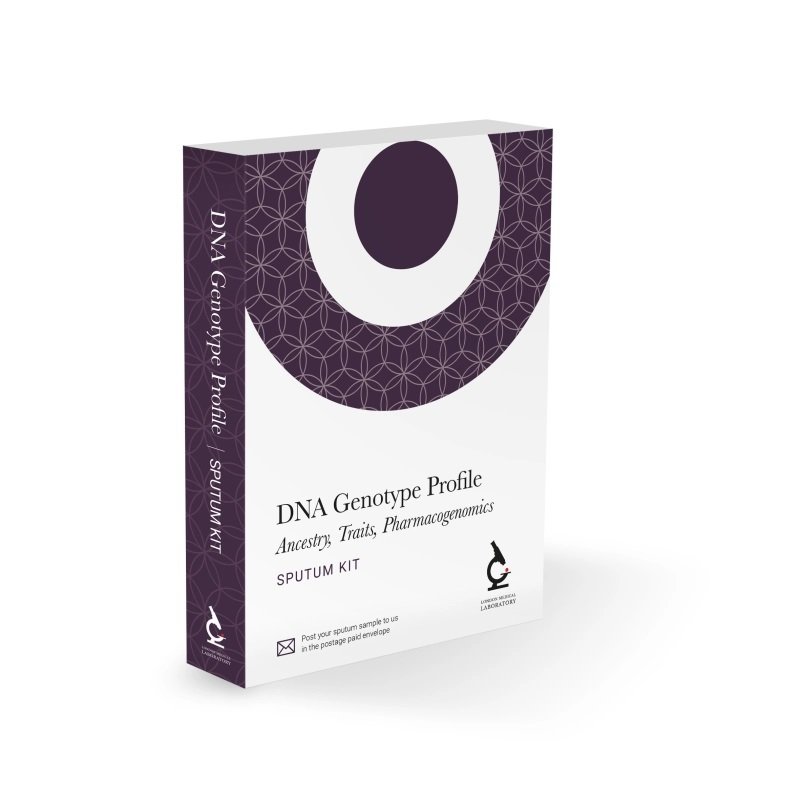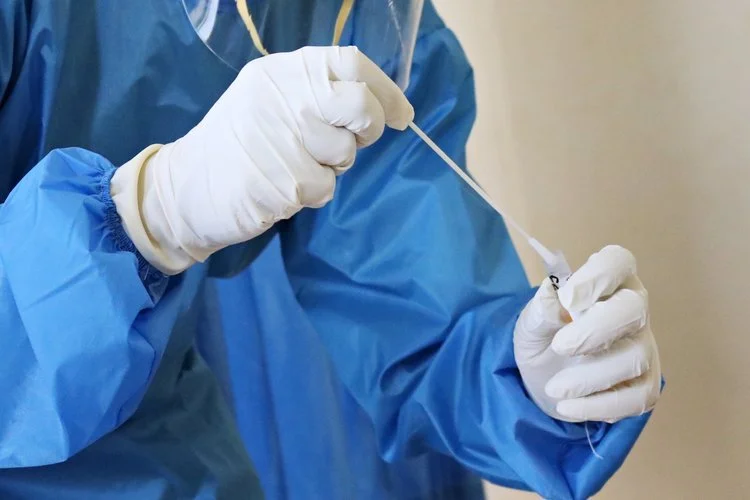Ancestry DNA Test
Ever wanted to trace your ancestry?
What about your risk of developing a disease or illness?
Or how medications react with your body?
This DNA Genotype Profile at home test kit can discover the answers to these questions for you! All it requires is a saliva sample.
Genotype profile testing may not be a household term yet, but it’s likely it soon will be. In fact, we believe Genotyping will be the next revolution in health care, leading to tailored precision medicines and personalised healthcare programmes.Many of our health issues, from sleep disorder to heart problems, can be identified by our unique DNA profile. Once unlocking the secrets of our DNA was the stuff of science-fiction, but today it’s all down to a simple saliva test.
Ancestry:
This, simple to carry out, genotype saliva test compares our genetic profile with reference datasets of 150+ populations, based around 37 clusters in different continents and regions. It reveals the proportion of various modern populations recorded within our own individual genetic makeup. For example, the test may indicate that our ancestry is approximately 50 percent African, 25 percent European, 20 percent Asian, and 5 percent unknown.
Ancestry Percentage
DNA Report:
A simple saliva test can now identify a huge number of conditions including potential allergies and addictions, sleep disorders, cardiac problems, diabetes and bone health, while providing health and wellbeing information. Every one of us has inherited DNA that stretches back thousands of years. It may still play a part in people’s appearance and how they perceive the world. The DNA report tests over 300 traits, of which the main categories are listed below.
NUTRI GENOMICS
Response To Macronutrients
Food Sensitivities
Eating Perceptions
Psychology Of Eating
Weight Loss Management
FITNESS GENOMICS
Endurance Training Attributes
Flexibility
Exercise Response
ALLERGY
Food Allergies
Skin Allergies
Nasal Allergies
ADDICTION
Alcohol Addiction
Cannabis Addiction
Cocaine Addiction
Heroin Addiction
Nicotine Addiction
Opioid Addiction
HAEMATOLOGICAL DISEASES
Morphology And Texture
Photoaging
Chronic Inflammatory Conditions
Autoimmune Disorders
HORMONAL DISORDERS
Pituitary Disorders
Thyroid Disorders
Paediatric Disorders
Adrenal Disorders
Osteoporosis And Bone Health Disorders
Diabetes
Women's Health
Men's Health
OPHTHALMOLOGY
Refractive Error
Corneal Disorders
Ophthalmic Disorders
Orbital Disorders
Retinal Disorders
DERMATOLOGY
Morphology and Texture
Photoaging
Chronic Inflammatory Conditions
Autoimmune Disorders
GASTROINTESTINAL DISORDERS
Digestive Tract Disorders
GI Accessory Disorders
NEUROLOGY
Learning And Developmental Disorders
Neurodegenerative Disorders
Demyelinating Disorders
Eating Disorders
Musculoskeletal Disorders
Sleep Disorders
Psychiatric Disorders
Nervous System Disorders
Chronic Neurological Disorders
Anxiety Disorders
PERSONALITY TRAITS
Cognitive Ability
Extraversion
Openness
Agreeableness
Conscientiousness
Neuroticism
RENAL DISORDERS
Endocrine And Metabolic Disorders
Congenital Renal and Genitourinary Condition
Chronic Renal Conditions
Inherited Renal Conditions
Glomerular Disorders
Congenital Renal Diseases
Systemic Lupus Erythematosus
Urinary Calculi
CIRCADIAN RHYTHM ASSOCIATED TRAITS
Sleep Disorders
Chronotype
Sleep Characteristics
LIFESTYLE GENOMICS
Cardiac
Diabetes
Weight Management
PULMONARY DISORDER
Respiratory Failure
Infectious Disease
Interstitial Lung
Deficiency Disorders
Inflammation Disorders
BONE HEALTH AND DISEASES
Bone Health and Density
Joint Disorders
Bone disorders
Please note you will receive your results within 4 weeks of the lab receiving your sputum sample.
Pharmacogenomics Report (PGx):
Pharmacogenomics is the study of how our genes can affect how our bodies respond to medications. It looks at how our bodies process drugs and how drugs can impact our bodies. Our genetic makeup can influence how we metabolise and respond to medications.
By examining specific gene variations related to pharmacogenomics, a special test called Pharmacogenomics (PGx) test can help doctors determine if a medication is likely to work well for a person or if they might experience side effects, bad reactions, or toxicity from it. This test can predict the risk of negative reactions before a person even starts taking the medication making it safer for patients.
What medications are tested?
Attention Deficit Hyperactivity Disorder (ADHD): Atomoxetine, Methylphenidate
Cardiovascular Disease: Amiodarone, Atenolol, Atorvastatin, Bisoprolol, Carvedilol, Clonidine, Clopidogrel, Disopyramide, Flecainide, Fluvastatin, Metoprolol, Nebivolol, Prasugrel, Propafenone, Quinidine, Ranolazine, Simvastatin, Sotalol, Ticagrelor, Triveram, Vernakalant
COPD:Umeclidinium
Diabetes: Glibenclamide, Gliclazide, Glimepiride, Tolbutamide
Gastrointestinal Disorders: Dexlansoprazole, Esomeprazole, Lansoprazole, Metoclopramide, Omeprazole, Pantoprazole, Rabeprazole
Immunological Disorders: Cevimeline
Infectious Diseases: Atazanavir, Dolutegravir, Efavirenz, Flucytosine, Peg-Interferon-Alpha, Raltegravir, Ribavirin, Telaprevir, Voriconazole
Inflammatory Disease: Aceclofenac, Aspirin, Celecoxib, Diclofenac, Dipyrone, Flurbiprofen, Ibuprofen, Indomethacin, Lornoxicam, Lumiracoxib, Meloxicam, Nabumetone, Piroxicam, Tenoxicam
Muscle Disease: Amifampridine, Amifampridine Phosphate, Tolperisone
Neurological Disorders: Deutetrabenazine, Donepezil, Galantamine, Tetrabenazine, Valbenazine
Oncology: Belinostat, Capecitabine, Fluorouracil, Gefitinib, Irinotecan, Nilotinib, Ondansetron, Pazopanib, Rucaparib, Tamoxifen, Tegafur, Tropisetron
Pain: Carisoprodol, Codeine, Elagolix, Naproxen, Oxycodone, Tramadol
Psychiatric: Amoxapine, Aripiprazole, Aripiprazole Lauroxil, Brexipiprazole, Brivaracetam, Cariprazine, Citalopram, Clobazam, Clozapine, Desipramine, Desvenlafaxine, Duloxetine, Escitalopram, Fluoxetine, Flupenthixol, Fluphenazine, Fluvoxamine, Haloperidol, Iloperidone, Lacosamide, Moclobemide, Nefazodone, Nortriptyline, Olanzapine, Paliperidone, Paroxetine, Perphenazine, Pimozide, Pitolisant, Propranolol, Protriptyline, Quetiapine, Risperidone, Sertindole, Sertraline, Thioridazine, Venlafaxine, Vortioxetine, Zuclopenthixol,
Renal Disorders: Lesinurad, Mirabegron, Tolterodine
Respiratory Tract: Arformoterol, Indacaterol
Rheumatoid Arthritis: Upadacitinib
How Does It Work?
Step 1: Order your test kit
Order your home test kit on our website. The DNA Genotype Profile Home Test Kit will be sent to your address within a week.
Step 2: Provide a saliva sample
Follow the instructions in the test kit, provide a sputum sample and then package the sample in the prepaid envelope. Send the sample to the laboratory to be analysed.
Step 3: Receive your results
You will receive your personalised results via email within 4 weeks. Enjoy!
Case Study : Is Gambling In Our Genes?
Around 2% of the population in the United Kingdom is affected by Gambling Disorder, a type of addiction that can have negative effects on individuals and their relationships. An intriguing study published in the journal "Addiction" focused on identical twins and non-identical twins and discovered that genetic factors accounted for approximately 70% of the differences observed in their gambling behaviors. This study utilized a test that identifies variations in specific genes that play a role in our actions and behaviors. For instance, differences in a gene called HTR2A have been linked to a higher susceptibility to obsessive or compulsive behavior. Likewise, a specific variant in our CNR1 gene has been associated with individuals placing considerably larger bets compared to those who do not possess this variant.




